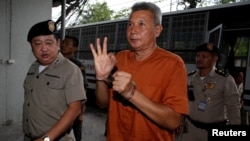A Thai country singer and political activist was sentenced Monday by a military court to more than three years in jail for insulting the monarchy, adding to a 7-year sentence a criminal court imposed on him earlier for the same offense.
Thanat Thanawatcharanon, known by his stage name Tom Dundee, was convicted and sentenced under Article 112, which makes criticism of the monarchy and the king punishable with up to 15 years in jail. The lese majeste law has been used prodigiously by the military government that came to power in a May 2014 coup.
Thanat got into trouble because of the speeches he made in 2013 at a rally organized by the so-called Red Shirts, who are supporters of a charismatic prime minister ousted in an earlier military coup supported by the Yellow Shirt royalists.
The case in criminal court followed complaints by a Yellow Shirt group. The second case involving the same speeches was transferred to a military court after the 2014 coup.
Thanat's lawyer Saowalux Po-Ngam said his client was sentenced to five years in jail for the second case, but the time was reduced to three years and four months because he confessed.
"The reason he decided to confess in the first place was because he had applied for bail over three times and was rejected every single time,'' said Saowalux. "Through the confession, we can get to work on applying for a royal pardon.''
Confessions are commonplace in lese majeste cases as it ensures a certain degree of leniency for the accused.
The junta has been increasingly doling out criminal sentences against those critical of the government, which is seen as an insult to the monarchy. It has also used other laws to silence critics. On Sunday, authorities arrested four university students and a journalist under a law that prohibits criticism or campaigning negatively against a referendum to be held Aug. 7 on a new draft constitution. The five were detained because police found "vote no'' stickers during a car search.
The Thai Journalists Association condemned the arrest of the journalist, saying the police are holding him without evidence. The journalist was in the area to report on the students' political activities and asked for a ride back to Bangkok with the activists. He was detained despite having identified himself as a journalist.
Since the 2014 coup, 53 lese majeste cases have been brought to court, with 40 stemming from online comments posted or shared, according to Human Rights Watch. In 2015, a man was sentenced to 60 years in prison for six alleged Facebook postings defaming the monarchy. His sentence was reduced by half when he pleaded guilty, making it Thailand's longest recorded sentence for the crime.
Thai Military Court Adds to Singer's Jail Term for Insults

BANGKOK —






